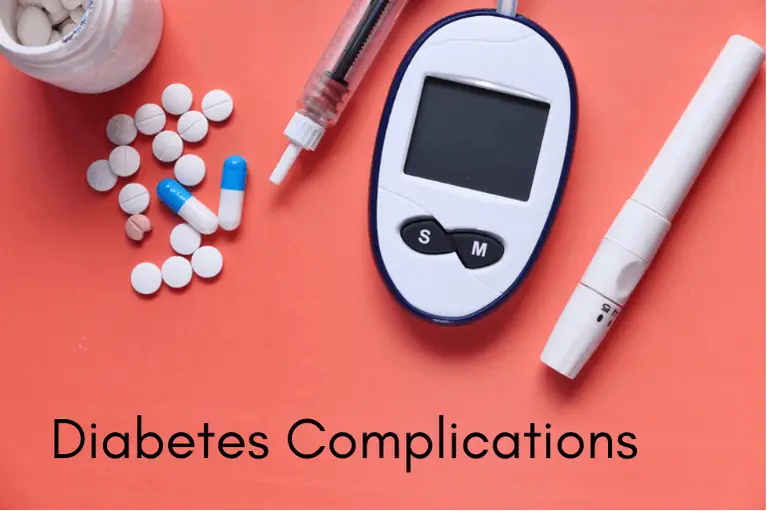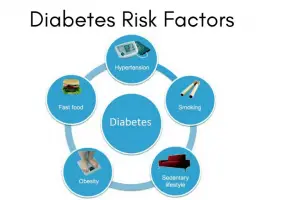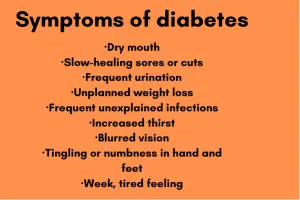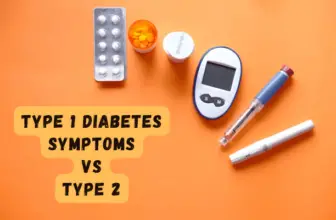Diabetes Complications – How Does It Affect The Body?

When you have diabetes, your body wouldn’t use and process glucose from food when you eat correctly. There are many different diabetes types and each type having another cause, but generally, they all share common problems of having excessive glucose in the bloodstream. Diabetes treatments include insulin and medications. You can avoid some types of diabetes by adopting healthy changes in your lifestyle.
What is diabetes?
Diabetes takes place when your body can’t take up glucose to use it for energy. That’s the main reason for the extra build-up of sugar in the bloodstream.
Flawed control can lead to serious diabetes complications that can damage the different tissues and organs of the body. Generally, the most common diabetes complications appear in blood nerves, kidneys, eyes, and heart.
Why my blood level is high? How does it happen?
The process of digestion includes the breakdown of the food we eat into different beneficial nutrient sources. When we eat rice, pasta, bread (carbohydrates), our body breakdown it into glucose for energy. Glucose present in tour bloodstream needs help from the insulin to get into the final destination.
The hormone insulin is made by an organ behind your stomach known as the pancreas. Our pancreas releases insulin into our bloodstream. In simple words, insulin is the key for glucose to unlock the door of the cells that allows glucose to enter the cells. As a result, glucose provides energy to your body’s tissues and organs to work efficiently.
If you have diabetes
- Your pancreas will not be able to make enough insulin.
Or
- It may be possible that your pancreas is making insulin, but the cells of your body aren’t normally responding to it as they usually do.
In that case, glucose isn’t going in your cells and remains in the blood, raising its level.
What are the different diabetes types?
Here are some common diabetes types:
Type 1 diabetes:
This type is an autoimmune disease, which means your body attacks itself. In such a situation, the insulin-producing cells are destroyed. Up to 10% of people having diabetes have type 1. It can probably develop at any age but is usually diagnosed in young adults and children before it was known as “Juvenile.” This diabetes type is also known as insulin-dependent diabetes because people suffering from it have to take insulin daily.
Type 2 diabetes:
In this type, either your body isn’t making enough insulin, or your body’s cells don’t usually respond to the insulin. It’s the most common type of diabetes worldwide, and about 95% of diabetic people have type 2 diabetes. Most middle-aged and older people suffer from it. It’s also known as insulin-resistant diabetes and adult-onset diabetes.
Pre-diabetes:
It is a stage before you are officially diagnosed with type 2 diabetes. In that case, your blood glucose levels are higher, but it is not at that level to be diagnosed with type 2 diabetes.
Gestational diabetes:
Gestational diabetes develops primarily in women during pregnancy. Mostly it goes away after delivery. However, if you had gestational diabetes, you will be at higher risk of developing type 2 diabetes.
Less known and uncommon diabetes types include:
Monogenic diabetes syndrome:
Monogenic diabetes syndrome includes maturity-onset diabetes of the young and neonatal diabetes. It accounts for 4% of cases and is a rare inherited diabetes form.
Chemical or drug-induced diabetes:
This type of diabetes occurs after the transplantation of organs, AIDS / HIV treatment, or link with glucocorticoid steroid usage.
Cystic fibrosis-related diabetes:
This type of diabetes is only specific to the people who have this disease.
Diabetes insipidus:
It’s a condition that results in a situation in which your kidney produces a large amount of urine.
How common is diabetes?
In the U.S., about 1 in 10 people approximately 34.2 million people have diabetes. In this counting, about 7.3 million people are adults age between 18 and older, and among them, 1 in 5 people don’t even know they have diabetes. With age, the number of people diagnosed with diabetes increases. About 1 in 4 people of age 65 and older have diabetes.
Who gets diabetes, and what is its risks factor?

The risk factors and diabetes complications vary with the type of diabetes you develop.
Type 1 diabetes risks factors:
- Having a parent history of type 1 diabetes
- A pancreatic injury like tumor, surgery, accident, or maybe an infection
- Exposure to virus-related illness
- Physical stress like illness or surgery
- Due to auto-antibodies that attacks your body organs and tissues
Risk factors for type 2 diabetes and pre-diabetics include:
- Being overweight
- Having high blood pressure
- Family history
- Being Hispanic, African-American, Asian-American, or Pacific islander
- Age of 45 or older
- Being a smoker
- Having POS (Polycystic ovary syndrome)
- Having a stroke or any heart disease history
- Due to having gestational diabetes or giving birth to a baby weighing more than 9 pounds
- Being very lazy and physically inactive
- Having low levels of good cholesterol and high level of triglycerides
Risk factors for gestational diabetes include:
- Being over 25 years of age
- Overweight before pregnancy
- Being Hispanic, Asian American, African American, and Native American
- Family history of having type 2 diabetes or pre-diabetes
Causes of diabetes
Regardless of the type of diabetes, the common cause of diabetes includes having too much glucose in the bloodstream. But the leading cause of the high level of blood sugar depends on the type of diabetes you are having.
Cause of type 1 diabetes:
It’s an immune system disease in which your own body attacks the insulin-producing cells in your pancreas. As there is not enough insulin to allow the glucose to enter the body cells, glucose starts to build up in your blood. In some patients, genes can be its cause, or a virus would cause the immune system attack.
Cause of type 2 diabetes:
In type 2 diabetes, our cells become more resistant to insulin and don’t allow it to work as it should. As a result, there is an increase in the level of glucose in the bloodstream. Your pancreas can’t keep up to make enough insulin to overcome this resistance.
Gestational diabetes:
During pregnancy, there are some hormones produced by the placenta that make the cells of your body more resistant to insulin. The pancreas isn’t able to make insulin required to overcome its resistance. In the end, there will be more than the average level of glucose in your bloodstream.
Symptoms of diabetes

Symptom of diabetes includes:
- Dry mouth
- Slow-healing sores or cuts
- Frequent urination
- Unplanned weight loss
- Frequent unexplained infections
- Increased thirst
- Blurred vision
- Tingling or numbness in hand and feet
- Week, tired feeling
Other symptoms:
In men: Erectile dysfunction, decrease in sex drive, decrease in muscle strength.
In women: Dry and itchy skin, Urinary tract infection, Frequent yeast infection.
Type 1 diabetes symptoms:
Symptoms for type 1 diabetes develop quickly, about in weeks or maybe in months. Symptoms can begin when you are a child, teenager, or perhaps an adult. Some additional symptoms include vomiting, yeast infection, nausea, or possibly urinary tract infection.
Pre-diabetic and Type 2 diabetes symptoms:
In this condition, you may not have any symptom at all or may not notice at the start as they develop over several years. Symptoms usually begin to build when you are an adult. But it is not specific to any age and can occur at any time in life.
Gestational diabetes:
Generally, women don’t notice any symptoms. However, the obstetrician will test you for gestational diabetes at 24 to 28 weeks of pregnancy.
Are You One Of The 33% Of Americans That Suffer From Type II Diabetes? This Clinically Proven Remedy Has Helped Thousands Balance Blood Sugar Levels For The First Time In Years.70% Discount + FREE Shipping! 100% Money-Back Guarantee!
Diabetes Complications – How does it affect the body?
It may take some work to control diabetes, but in the end, the results will worth it. Uncontrollable diabetes means your blood sugar level is too high even if you use any treatment. In that case, you may have more symptoms like being thirsty, peeing more, and some other diabetes complications.
If you don’t control it, you may be setting up for a host of diabetes complications. Diabetes complications can be seen on every organ, including your
- Kidneys
- Heart and blood vessels
- Eyes
- Gums and teeth
- Nerves
- Gastrointestinal tract
Heart and Blood Vessels
In diabetes complications, heart and blood vessels problem is the most common one for people having diabetes out of control. Diabetic patients have twice the chances of getting heart problems and strokes compare to people who don’t have diabetes.
Nerve or blood vessel damage can result in foot problems, but they rarely develop into amputations. However, people who have uncontrollable diabetes are ten times more likely to have their feet and toes removed than people without diabetes.
Symptoms:
You may not notice any symptoms or warnings until you have a stroke or maybe a heart attack. Having problems with large blood vessels can result in minor sensations, skin color changes, or perhaps leg cramps.
Bright Side:
According to the research controlling your diabetes with medications, exercises, and diet can help avoid diabetes complications. In addition, if you already have them, it will stop them from getting any worse.
Eyes
In the U.S., among adults of age 20 to 74, diabetes is the leading cause of vision loss. It can result in different eye problems and some of which can result in blindness if left untreated.
- Cataracts
- Glaucoma
- Diabetes retinopathy involves small blood vessels in the eyes
Symptoms:
Sudden loss in vision or vision problems
Bright side:
According to studies, well-timed treatment and regular eye examination can prevent 90% of eye-related diabetes complications.
Kidney Disease
In the adults of the U.S., diabetes is the leading cause of kidney failure and accounts for almost half of the latest cases.
Symptoms:
There are generally no apparent symptoms of early diabetes-related kidney diseases. However, in later stages, it shows the swellings in the feet and legs.
Bright side:
Drugs that lower your blood pressure and blood sugars even if you aren’t suffering from High B.P. can reduce the kidney failure risk by 33%.
Nerves
Over time, high B.P can harm the nerves. About 70% of diabetic patients get this type of damage.
Peripheral diabetic neuropathy:
It can result in sensation loss, burning, and pain in the feet. Pain generally starts with toes, and with time it can affect hands and other body parts.
Diabetic amyotrophy:
It can result in lancinating pain, burning, and aching in the thigh and hip, followed by thigh muscle weakness. It’s a rare condition.
Autonomic neuropathy:
It results from damage to the nerves controlling your internal organs. Its symptoms include digestive issues, sexual problems, trouble in sensation when your bladder is full, fainting, dizziness, and not knowing when blood glucose is low.
Bright side:
For pain treatment, there are many options available. Doctors prescribe an anticonvulsant that is generally prescribed for seizures but is also helpful in nerve pain. They may also give you drugs like patches or creams that will go on your skin. To stimulate your nerves, known as Transcutaneous electrical nerve stimulation.
Teeth
Diabetic patients have a high risk of gum diseases.
Symptoms:
Your gums may become red, swollen, and easily bleed.
Bright side:
Keeping your blood glucose level in control, taking good care of teeth by brushing, rinsing, and flossing with an antiseptic mouthwash, and visiting your doctor more often, you can avoid diabetes complications related to your teeth.
END WORDS BY THE WRITER
Some people control and even reverse their diabetes complications by making small lifestyle changes. And some may need medications or even surgery to manage the diabetes complications and even prevent their diabetes complications from getting worse.
The main focus of diabetes treatment is slowing down the damage. It includes changes in lifestyle, food, medications, surgery, and still, other options are available.
One of the best options to get rid of diabetes complications is maintaining the blood glucose level by proper eating, exercise, losing extra weight, avoiding smoking, and treating the high cholesterol and blood pressure levels.
References:
- Diabetes – Symptoms, and causes. (2021). Retrieved 30 June 2021, from https://www.mayoclinic.org/diseases-conditions/diabetes/symptoms-causes/syc-20371444
- Complications | ADA. (2021). Retrieved 30 June 2021, from https://www.diabetes.org/diabetes/complications
- The Risks and Complications of Uncontrolled Diabetes. (2021). Retrieved 30 June 2021, from https://www.webmd.com/diabetes/guide/risks-complications-uncontrolled-diabetes
- Topics, H. (2021). Diabetes Complications | MedlinePlus. Retrieved 30 June 2021, from https://medlineplus.gov/diabetescomplications.html
- Diabetes: Types, Risk Factors, Symptoms, Tests, Treatments & Prevention. (2021). Retrieved 30 June 2021, from https://my.clevelandclinic.org/health/diseases/7104-diabetes-mellitus-an-overview
- Put the Brakes on Diabetes Complications. (2021). Retrieved 30 June 2021, from https://www.cdc.gov/diabetes/library/features/prevent-complications.html
- Complications of diabetes – Wikipedia. (2021). Retrieved 30 June 2021, from https://en.wikipedia.org/wiki/Complications_of_diabetes
- diabetes, A. (2021). Complications. Retrieved 30 June 2021, from https://idf.org/aboutdiabetes/complications.html
- Us, A., Us, C., & Diabetes, L. (2021). Complications:: Diabetes Education Online. Retrieved 30 June 2021, from https://dtc.ucsf.edu/living-with-diabetes/complications/
Related Reading:






